8 best Kustomer alternatives for superior customer support in 2026

Kenneth Pangan
Last edited January 16, 2026

Kustomer is a big name in the AI-powered CRM world, giving support teams a single view of every customer interaction. It's a powerful tool, no doubt. But let's be real, it's not the perfect solution for everyone. Plenty of businesses start looking for Kustomer alternatives because of its price, complexity, or the need for features that are a bit more specialized.
If that sounds like you, you're in the right place. This guide will walk you through eight of the best alternatives to Kustomer, breaking down what makes each one tick. We'll help you find the right match for your team's size, budget, and what you're trying to accomplish in 2026.
Why look for Kustomer alternatives?
While Kustomer gets a lot right with its conversation-based timeline and AI chops, it's far from perfect. If you spend some time reading user reviews, a few common complaints start to surface. For many teams, these aren't just small annoyances, they're reasons to look elsewhere.
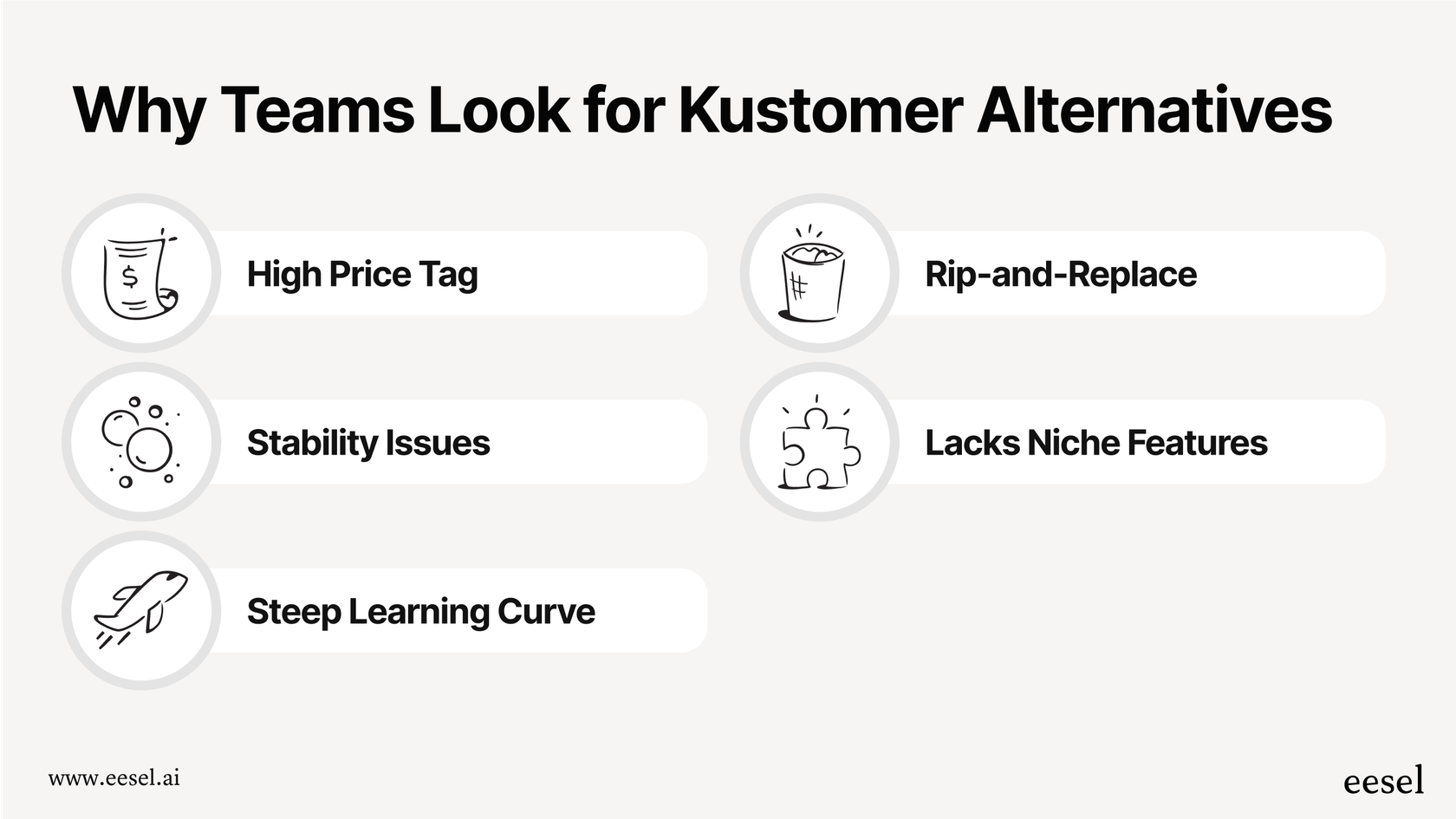
Here are the biggest reasons businesses start exploring other options:
- The price tag is a big one. Kustomer's pricing can get steep, fast. The per-agent cost is already on the higher side, but the real kicker is the AI add-ons. With features like AI Agents for Reps tacking on an extra $40 per user each month, the total bill can quickly get out of hand for growing teams.
- It can be a bit wobbly. Nothing tanks productivity like an outage. Users have reported occasional bugs and stability problems that throw a wrench in their workflows, leaving agents unable to help customers. When your helpdesk is down, your customer satisfaction plummets.
- The learning curve is steep. The user interface, while packed with features, can feel cluttered and confusing. Getting new agents up to speed takes time, which means more hours spent on training and fewer hours spent actually helping people.
- It's a "rip-and-replace" platform. Switching to Kustomer is a major undertaking. It's an entire platform that demands you move everything over from your current helpdesk. That kind of migration is a huge, disruptive project that can take months and pull your team away from other important work.
- It tries to be for everyone. Kustomer is designed to serve a ton of different industries, which means it sometimes lacks the specific, deep features that certain businesses really need. For example, it doesn't have the built-in, revenue-focused e-commerce tools you'd find in a platform designed just for online stores.
Our criteria for picking the best Kustomer alternatives
To make this list genuinely useful, we didn't just pick names out of a hat. We sized up each platform against a straightforward set of criteria to see how they really compare as Kustomer alternatives.
- Core features: How well does it handle the day-to-day stuff? We looked at ticketing systems, omnichannel support, and tools for agents to work together.
- AI and automation: How powerful is its AI, and can a normal person actually use it? We checked out features for automating workflows, helping agents out, and letting customers help themselves.
- Integrations: Does it play well with others? A good helpdesk has to connect smoothly with your CRM, e-commerce platform, and chat apps.
- Pricing and value: Is the price fair and easy to understand? We looked for clear pricing that gives you good bang for your buck without surprise fees.
- User experience: Is it actually easy to use? We thought about how intuitive the platform is for a support agent who has to live in it every day.
A quick comparison of top Kustomer alternatives in 2026
For those who just want the highlights, here's a quick rundown of how the best Kustomer alternatives stack up.
| Tool | Best For | Starting Price | Key Differentiator |
|---|---|---|---|
| eesel AI | Upgrading your existing helpdesk with AI | $239/month | AI layer, no migration needed |
| Zendesk | Large enterprises needing a scalable platform | $19/agent/month | Robust, enterprise-grade features |
| Freshdesk | Teams seeking a cost-effective, all-in-one solution | Free plan, paid from $15/agent/month | All-in-one platform with powerful automation |
| Gorgias | E-commerce brands on Shopify or BigCommerce | $10/month (ticket-based) | Deep e-commerce integrations |
| Salesforce Service Cloud | Businesses already in the Salesforce ecosystem | $25/user/month | Native Salesforce CRM integration |
| Zoho Desk | Teams using the Zoho product suite | Free plan, paid from $14/user/month | Seamless integration with Zoho CRM |
| Front | Collaborative, email-centric support teams | $19/user/month | Shared inbox experience |
| Gladly | High-touch support with large budgets | $150/agent/month | People-centric, not ticket-centric |
The 8 best Kustomer alternatives in detail
Alright, let's get into the nitty-gritty. Each of these platforms brings something different to the table, with its own strengths, weaknesses, and pricing.
1. eesel AI: A top choice among Kustomer alternatives for adding AI without switching helpdesks
Instead of being yet another helpdesk you have to migrate to, eesel AI is a smart AI layer that works right on top of the tools you already have, like Zendesk or Freshdesk. This sidesteps the single biggest headache of switching platforms. eesel AI can handle frontline support, draft replies for your agents with an AI Copilot, sort incoming tickets, and answer internal questions by learning from your company's knowledge, your past tickets, macros, Google Docs, and help center articles.
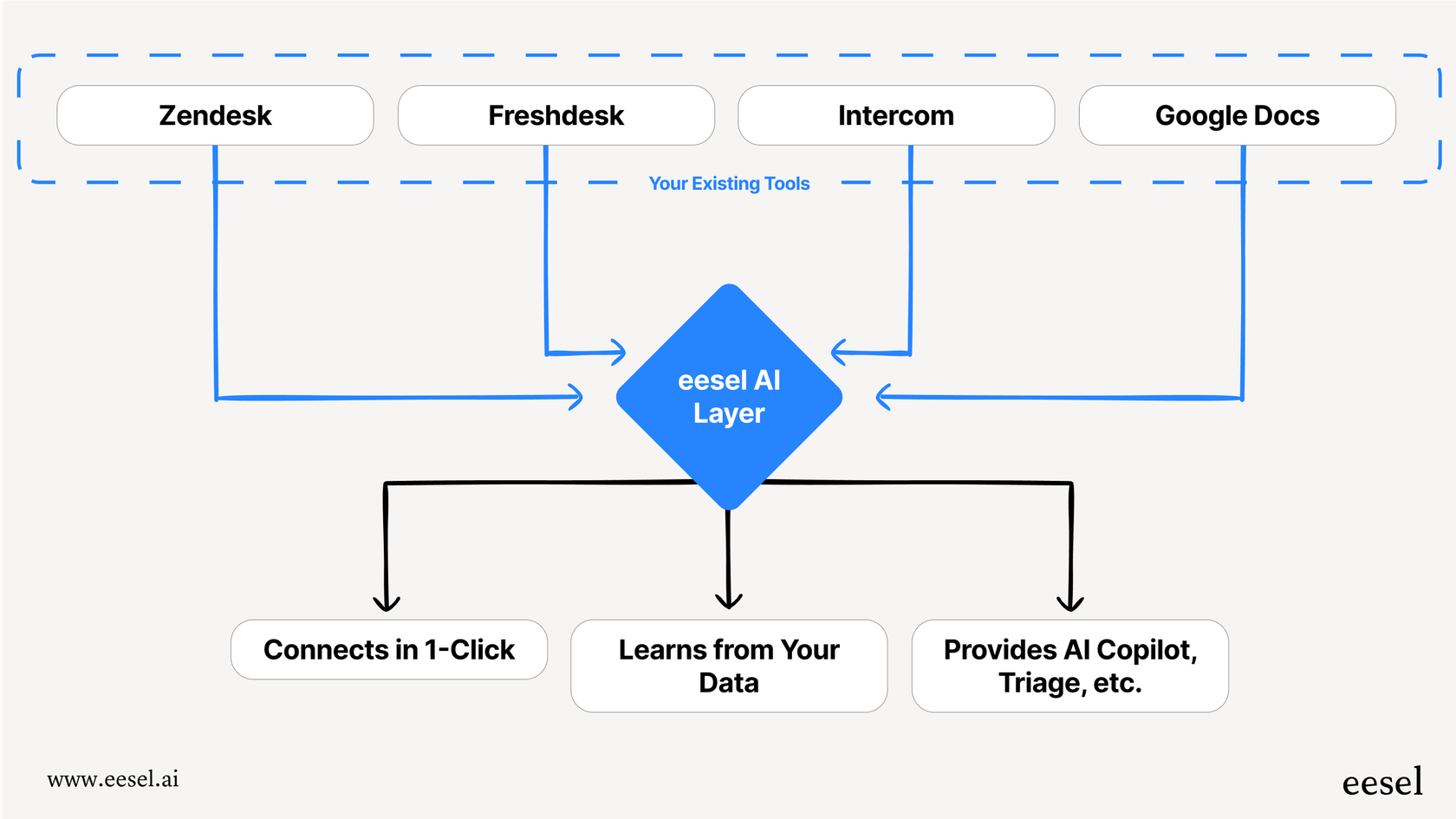
-
Why it's a top alternative: It delivers the advanced AI features Kustomer promises (and more) without forcing you to ditch your current helpdesk. You get the benefits of a powerful, custom-trained AI without the pain, cost, and risk of a full migration. You can even test how it would have performed on your past tickets before you flick the switch, which is a great way to see what you're getting into, risk-free.
-
Pros:
-
Connects in one click with over 100 tools. No migration drama.
-
Learns from your actual support history to give super accurate, in-context answers.
-
The "Simulate before you scale" feature lets you test its performance on old tickets.
-
Its interactions-based pricing is straightforward and easy to predict.
-
Cons:
-
It works best when you already have a helpdesk or knowledge base for it to learn from.
-
Pricing: Starts at $239/month for up to 1,000 AI interactions.
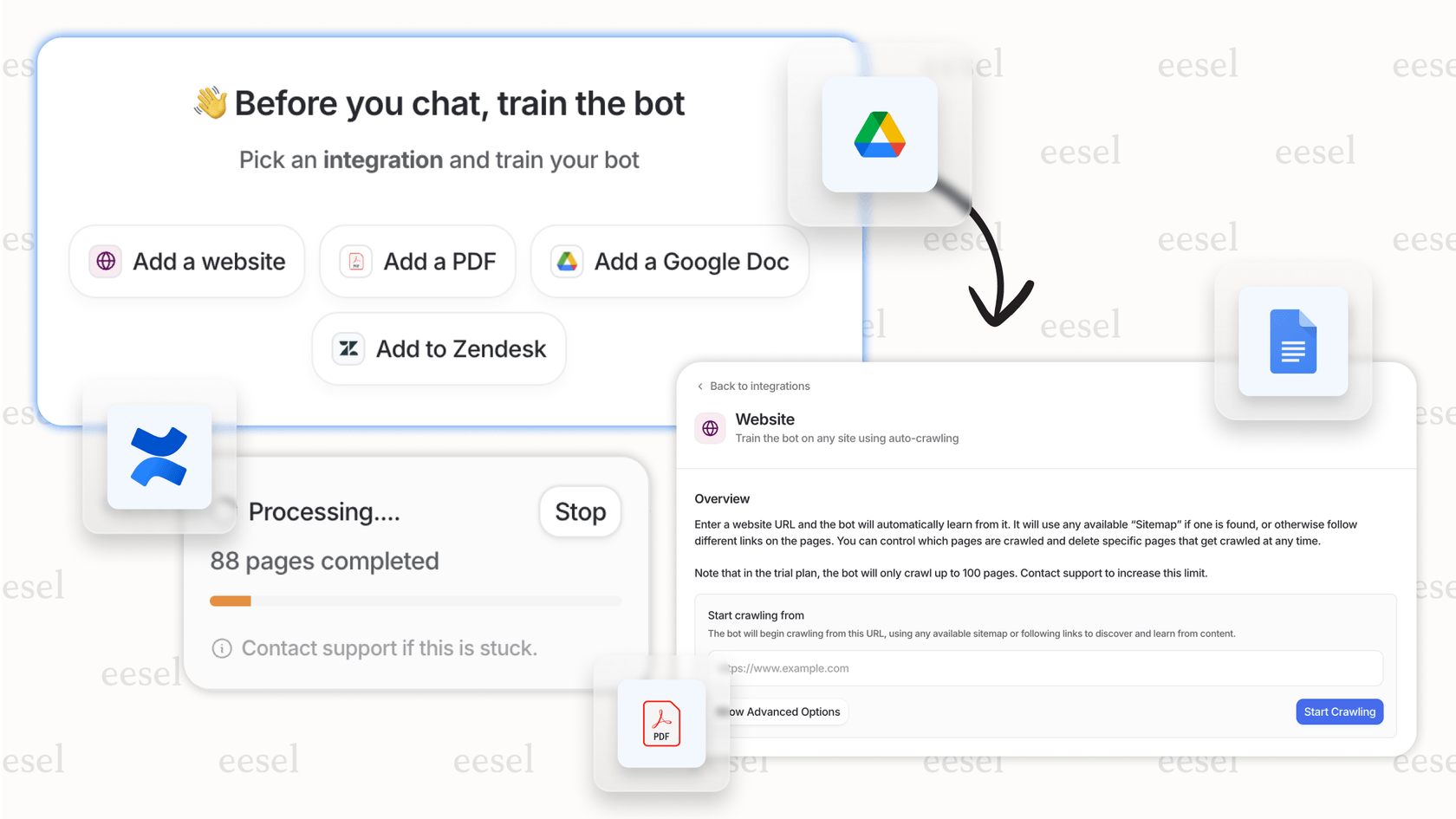
2. Zendesk: One of the top Kustomer alternatives for scalable, enterprise-grade support
Zendesk is a mature and trusted toolkit designed for high-performance customer service. It is built to scale alongside your business, providing sophisticated reporting, intelligent ticket routing, and a massive marketplace of integrated apps. For organizations that require a powerful platform, Zendesk remains a popular choice because of its extensive capabilities and proven reliability.
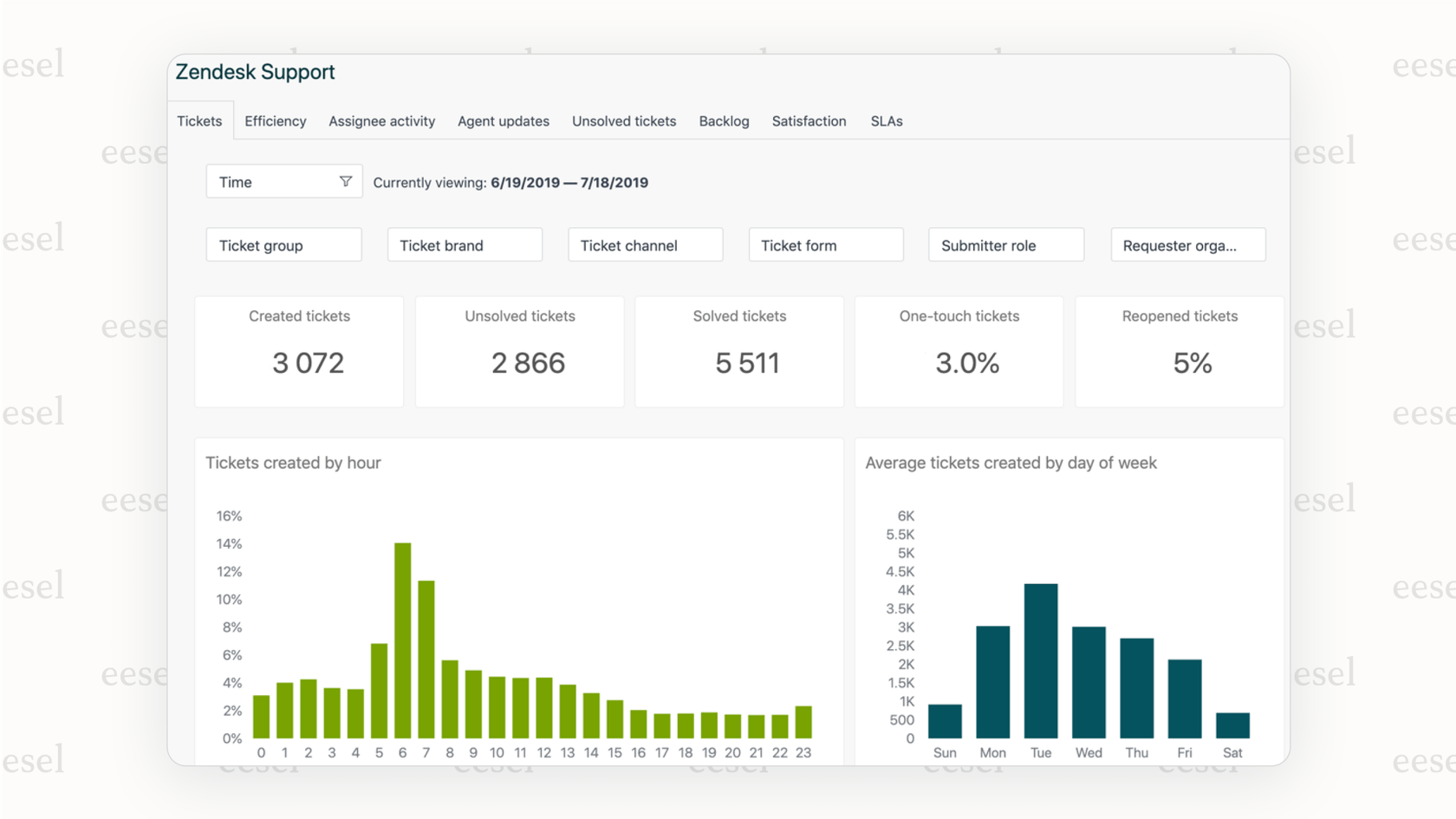
- Pros: It is a strong, reliable, and highly customizable platform that can be tailored to meet the needs of any growing team.
- Cons: Because of its comprehensive feature set, teams should dedicate time to the initial configuration to fully unlock its potential. Advanced AI capabilities are available through a tiered add-on structure.
- Pricing: Starts at $19/agent/month, with the popular Suite Team plan at $55/agent/month.
3. Freshdesk: One of the best Kustomer alternatives for a cost-effective, all-in-one solution
Freshdesk is a super popular, user-friendly helpdesk that offers a mature and robust toolkit for support teams. It delivers enterprise-grade omnichannel support, easy-to-set-up automations, and a powerful self-service portal. This makes it a fantastic pick for businesses looking for a reliable platform with a proven track record.
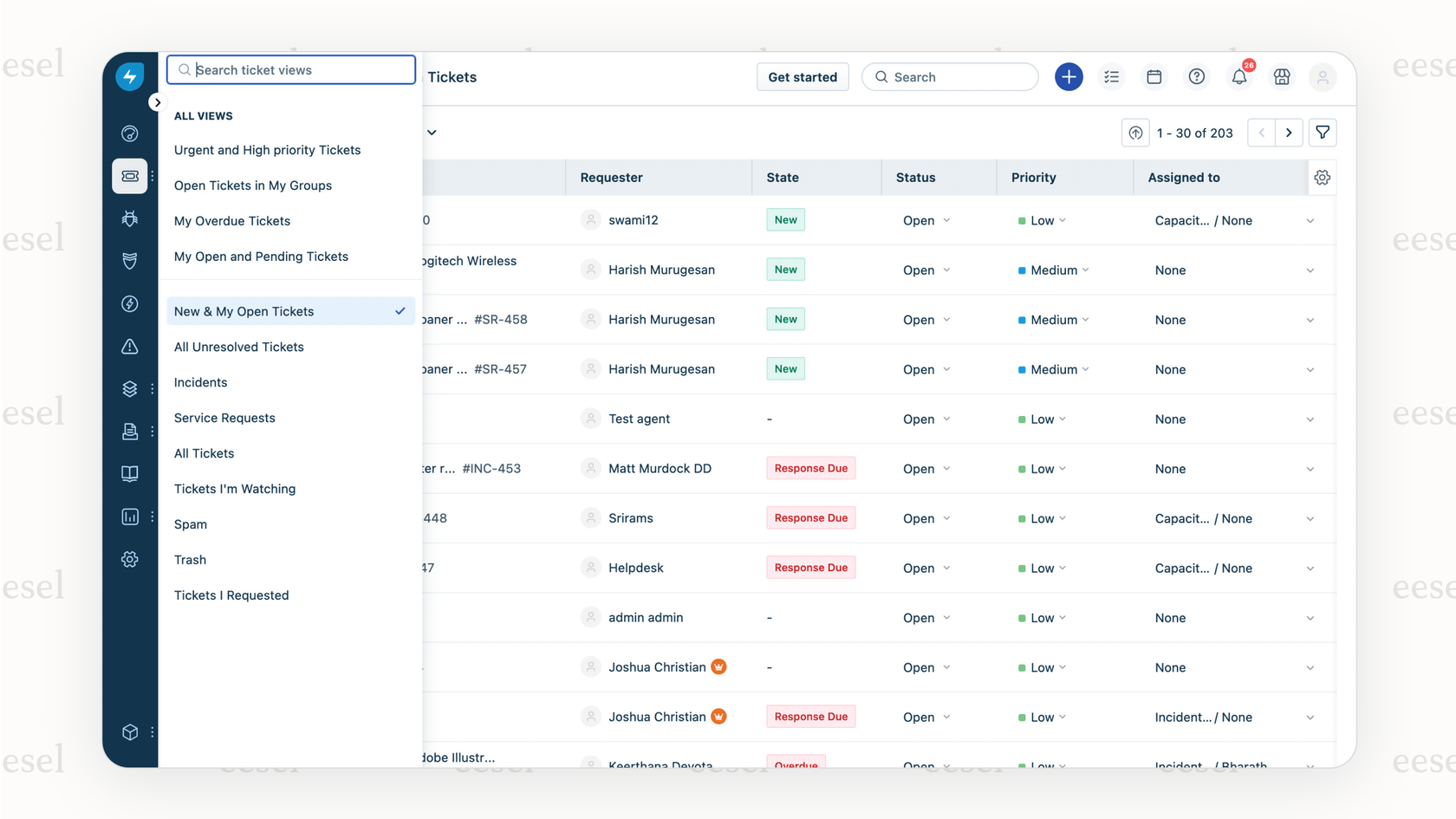
- Pros:
- Includes a generous free plan, a clean interface, and tiered options that grow with your team.
- Provides a reliable and scalable ecosystem for global support operations.
- Cons:
- Advanced Freddy AI features are prioritized for specific plans to help teams manage higher ticket volumes effectively.
- The extensive feature set means it’s worth spending a little time during initial setup to customize the platform for your specific workflows.
- Pricing: A free plan is available. Paid plans start at $15/agent/month.
4. Gorgias: One of the best Kustomer alternatives for e-commerce brands on Shopify
Gorgias is the industry-leading helpdesk built from the ground up specifically for e-commerce stores. It remains the gold standard for merchants, thanks to its deep, native integration with platforms like Shopify, BigCommerce, and Magento. This allows agents to view customer order history, edit orders, process refunds, and manage subscriptions directly from the support dashboard, effectively turning customer service into a powerful revenue channel.
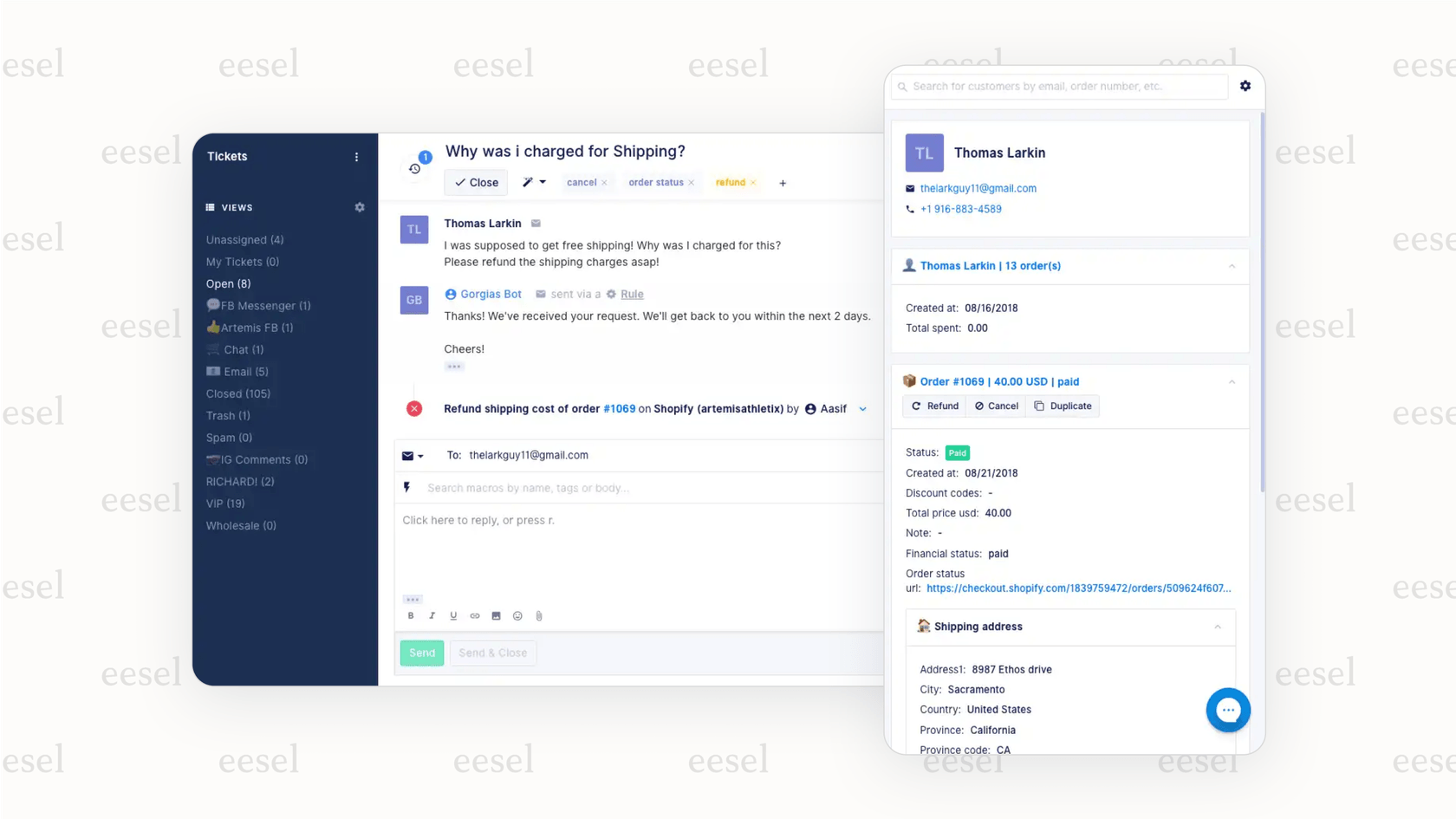
- Pros: Excellent for turning support into a revenue channel and managing social media commerce interactions with ease. It is a highly reliable and scalable platform that powers thousands of successful brands.
- Cons: Gorgias offers tiered ticket-based plans to match different team sizes and growth stages. Because it is highly specialized for the e-commerce sector, its features are expertly focused on providing the best possible experience for online retailers.
- Pricing: Starts at $10/month for 50 tickets.
5. Salesforce Service Cloud: A strong Kustomer alternatives pick for businesses inside the Salesforce ecosystem
For companies already living and breathing Salesforce CRM, Service Cloud is a logical and powerful next step. It gives you a complete picture of the customer by pulling in data from sales and marketing. Its built-in AI, Einstein, uses this deep integration to offer some pretty impressive automation and analytics.
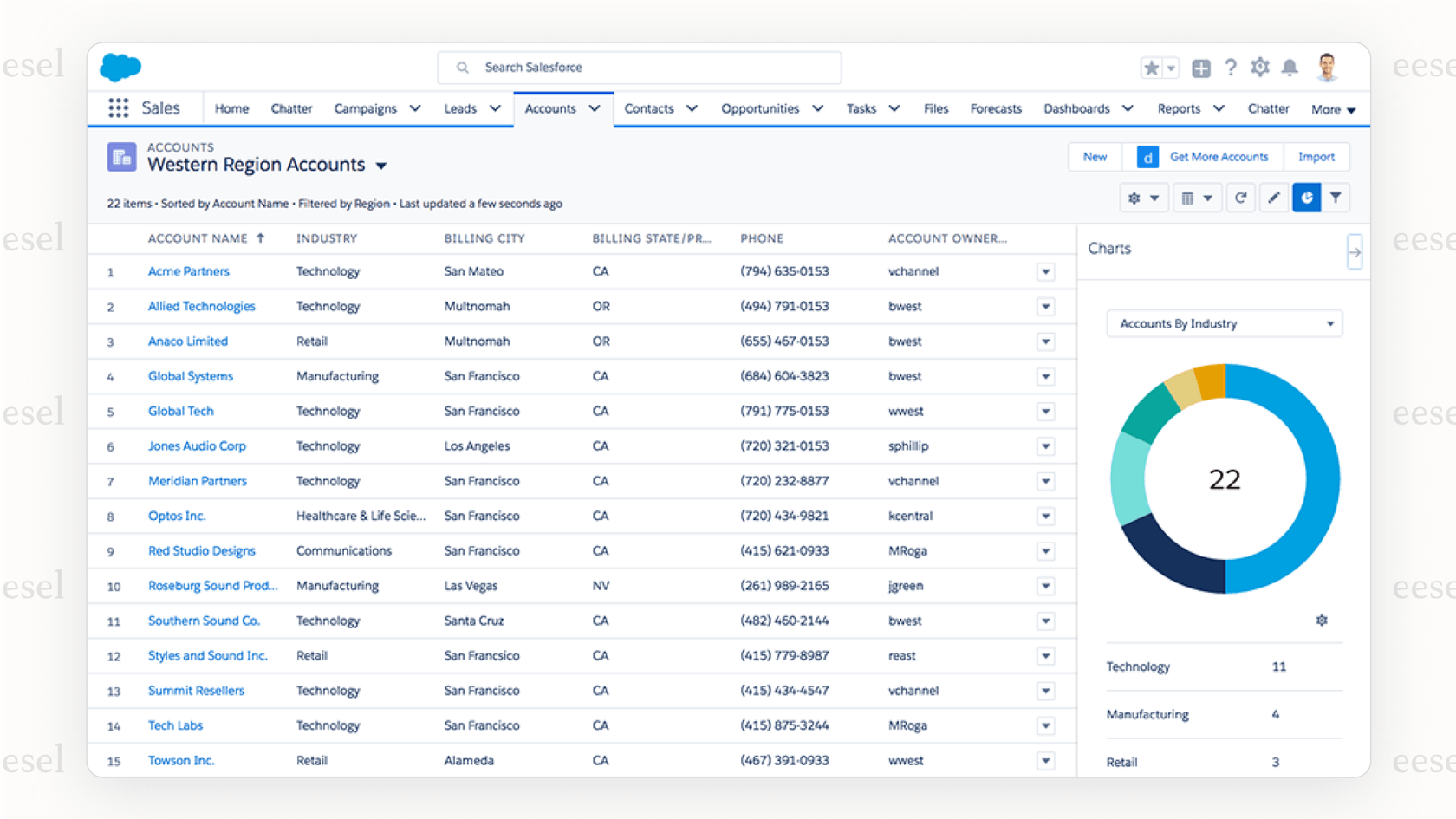
- Pros: You can't beat its integration with Salesforce CRM. It's also highly scalable and customizable.
- Cons: It's expensive and famously complicated to set up and keep running. If you're not already bought into the Salesforce world, it's usually way more than you need and not worth the setup headache.
- Pricing: Starts at $25/user/month for basic features.
6. Zoho Desk: One of the top Kustomer alternatives for teams already using the Zoho suite
Zoho Desk is a helpdesk that integrates smoothly with the massive Zoho ecosystem, including its popular CRM and analytics tools. It offers amazing value for money, with multichannel support and its Zia AI assistant included in affordable plans. This makes it a very tempting option for businesses that are already using other Zoho products.
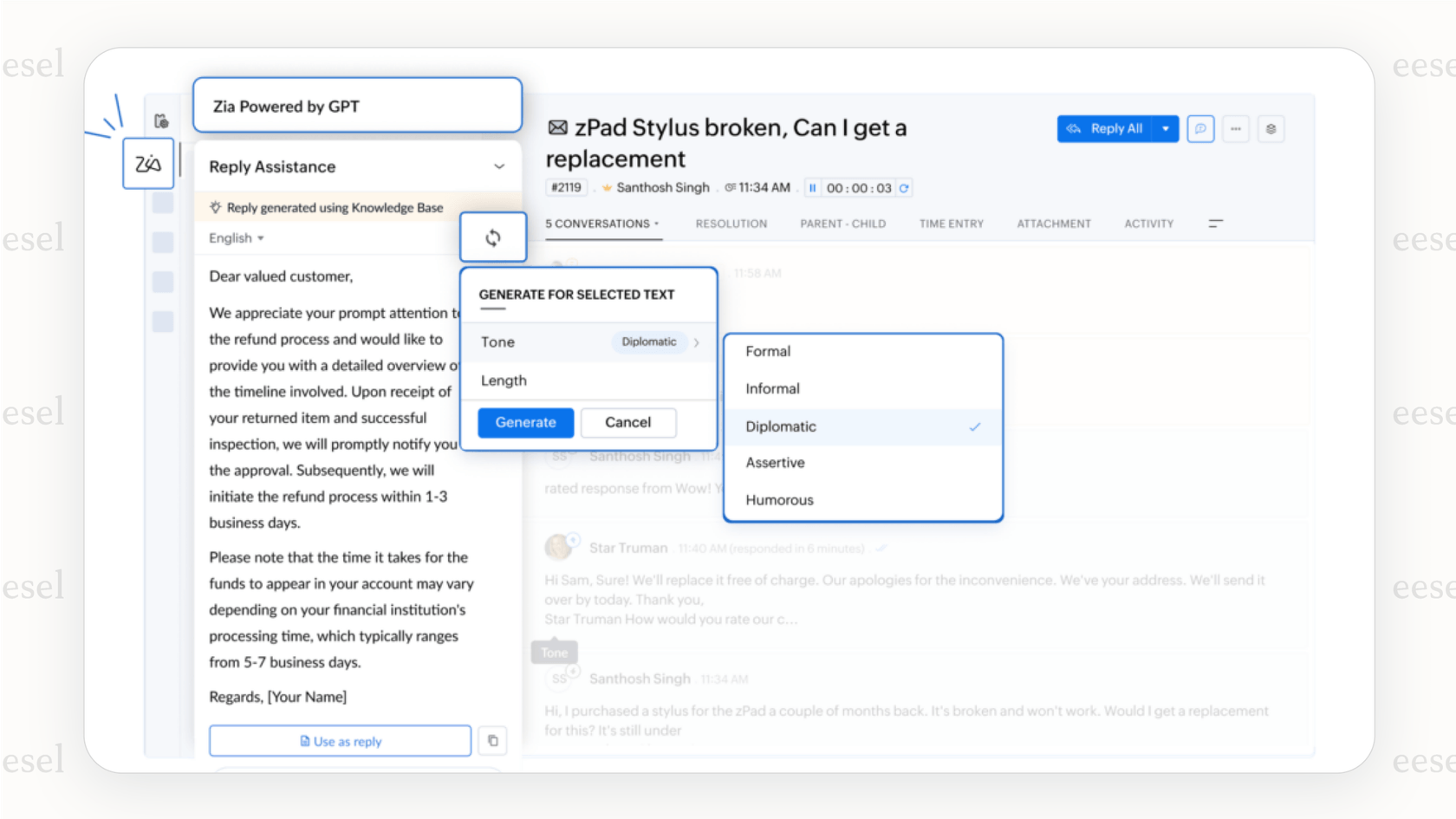
- Pros: Fantastic bang for your buck and plugs perfectly into other Zoho apps.
- Cons: The interface can feel a bit cluttered and not as intuitive as some of its rivals. It also doesn't connect with as many third-party apps as platforms like Zendesk or Freshdesk.
- Pricing: A free plan is available. Paid plans start at $14/user/month.
7. Front: One of the best Kustomer alternatives for collaborative, email-first support
Front is built around the idea of a shared, collaborative inbox. It's designed for teams who love the personal feel of email but need the organization, automation, and reporting of a proper helpdesk. It's perfect for managing team inboxes like support@ or sales@.
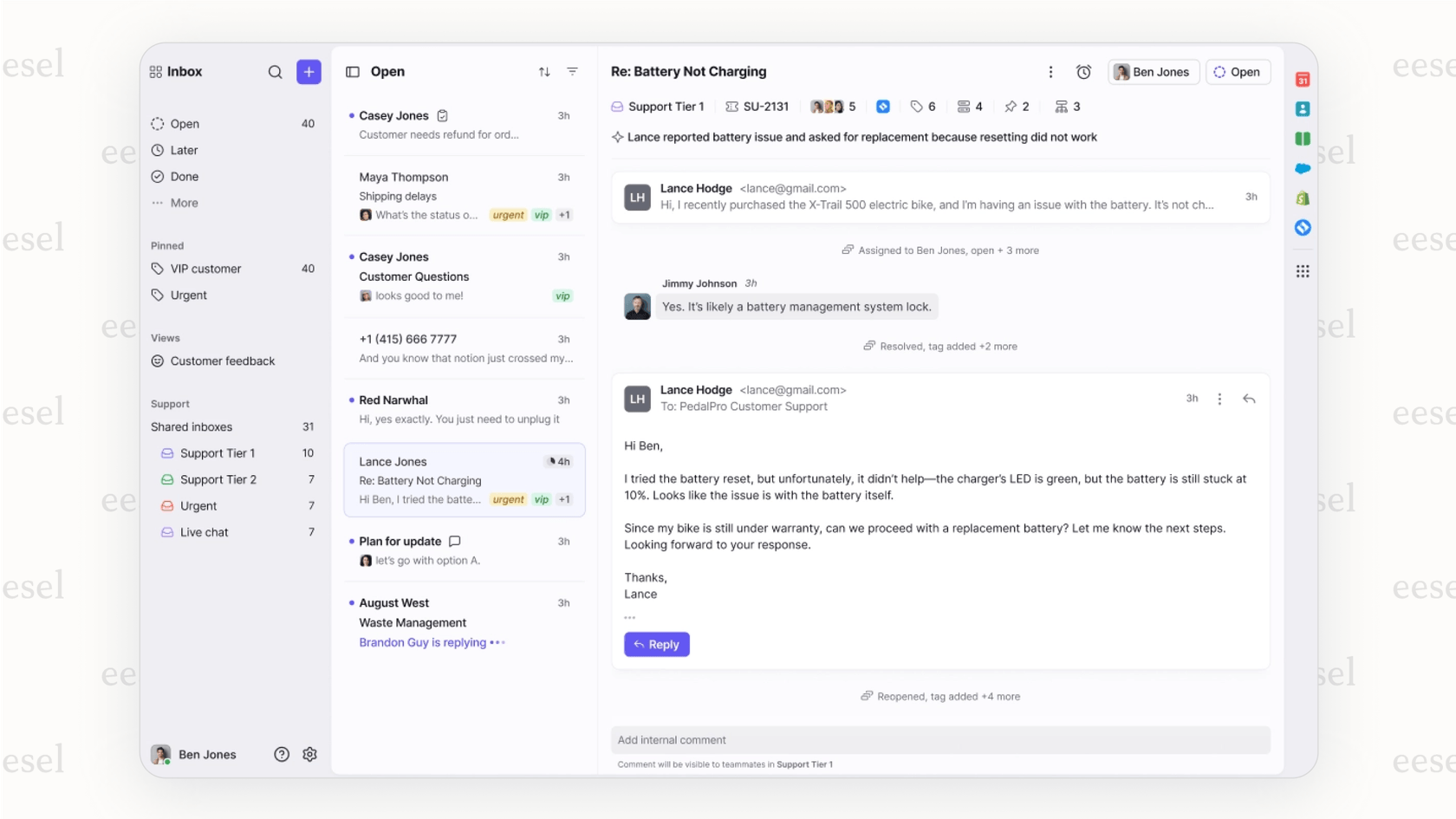
- Pros: Strong features for team collaboration and an intuitive feel for anyone who is used to a normal email client.
- Cons: It's missing some of the more structured tools of a traditional helpdesk. Key things like reporting and AI tools are also locked away in expensive high-tier plans, which limits its usefulness for teams on a tight budget.
- Pricing: Starts at $19/user/month with a two-seat minimum.
8. Gladly: A unique pick among Kustomer alternatives for a high-touch, non-automated approach
Gladly does things differently. It takes a "people-centric" approach, organizing everything around individual customers, not tickets. It creates one long, continuous conversation timeline for each customer, no matter how they get in touch. This makes it a great choice for brands that want to build deep, personal relationships.
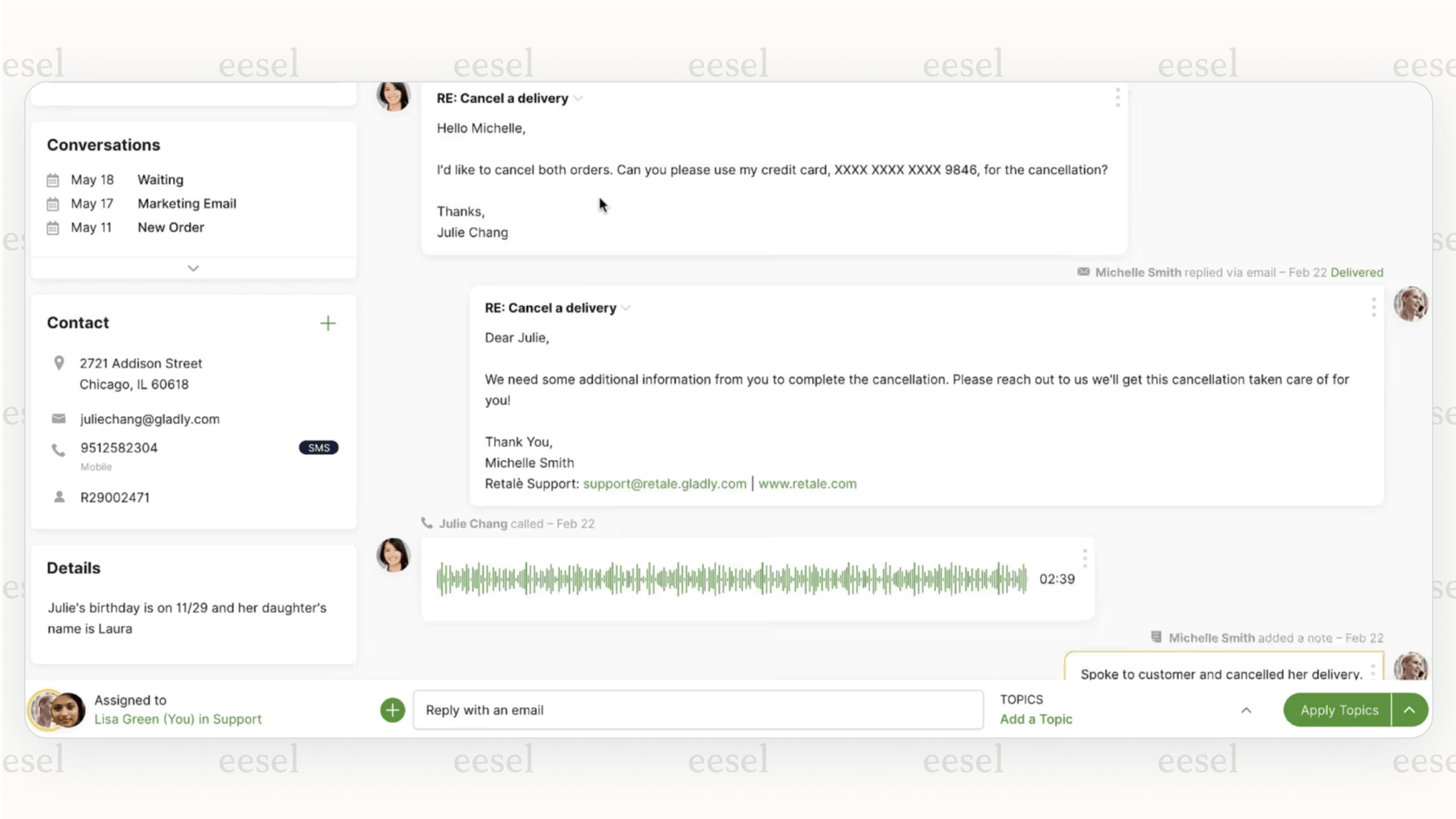
- Pros: Fantastic for giving white-glove, personalized service and building real customer loyalty.
- Cons: It is very expensive, with one of the highest per-agent starting prices out there. It's also deliberately light on automation, which means it's not a good fit for teams that handle a high volume of simple, repetitive questions.
- Pricing: Starts at $150/agent/month with a minimum of 10 agents.
How to choose the right platform from the Kustomer alternatives for your team
Look, the "best" tool is different for everyone. The right choice depends entirely on your team's specific needs, goals, and budget. Instead of getting lost in feature lists, use this simple flowchart to help you decide.
Pro tip: Don't just look at a pricing page. Sign up for free trials to get a real feel for how a platform works for both your agents and your customers before you sign any contracts.
Take any helpdesk to another level with eesel AI
Let's wrap up with a really important point: switching your helpdesk is a massive, expensive, and disruptive project. It can take months of planning and work, pulling your team away from their real job, helping customers.
That's what makes a tool like eesel AI a smart move. It's for businesses that want the latest AI automation without the chaos of a full migration. You can stick with the tools and workflows your team already knows, train a powerful AI on your own unique data, and see a real difference in ticket deflection and agent efficiency almost right away.
Ready to see how AI can improve your support without the migration nightmare? Start a free trial or book a demo of eesel AI today.
Frequently asked questions
Yes, absolutely. An AI layer like eesel AI is designed for this exact problem, adding powerful automation on top of your current helpdesk without any migration. This lets you avoid the disruption and costs of switching platforms while still upgrading your capabilities.
Gorgias is the go-to choice for e-commerce stores, especially those on Shopify, BigCommerce, or Magento. It integrates deeply with these platforms, allowing agents to view order histories and process refunds directly from the helpdesk, turning support into a revenue channel.
If budget is a top concern, Freshdesk and Zoho Desk are excellent starting points. Both offer robust free plans and very competitively priced paid tiers, providing great all-around functionality without the high price tag of Kustomer or other enterprise-focused tools.
For large-scale needs, Zendesk and Salesforce Service Cloud are industry-leading options. They are built to handle high ticket volumes, complex workflows, and extensive customization, making them reliable choices for enterprises that need a powerful and scalable platform.
If your company already uses Salesforce CRM, Salesforce Service Cloud is the most logical choice. Its native integration is unmatched, providing a unified view of the customer across sales and support. This ensures seamless data flow and powerful automations within the ecosystem you already know.
The best way is to identify your primary goal, like cost savings, e-commerce focus, or adding AI, and use the flowchart in this guide to narrow your options. Then, sign up for free trials of your top 2-3 choices to see how they feel in practice before making a final decision.
Share this post

Article by
Kenneth Pangan
Writer and marketer for over ten years, Kenneth Pangan splits his time between history, politics, and art with plenty of interruptions from his dogs demanding attention.





